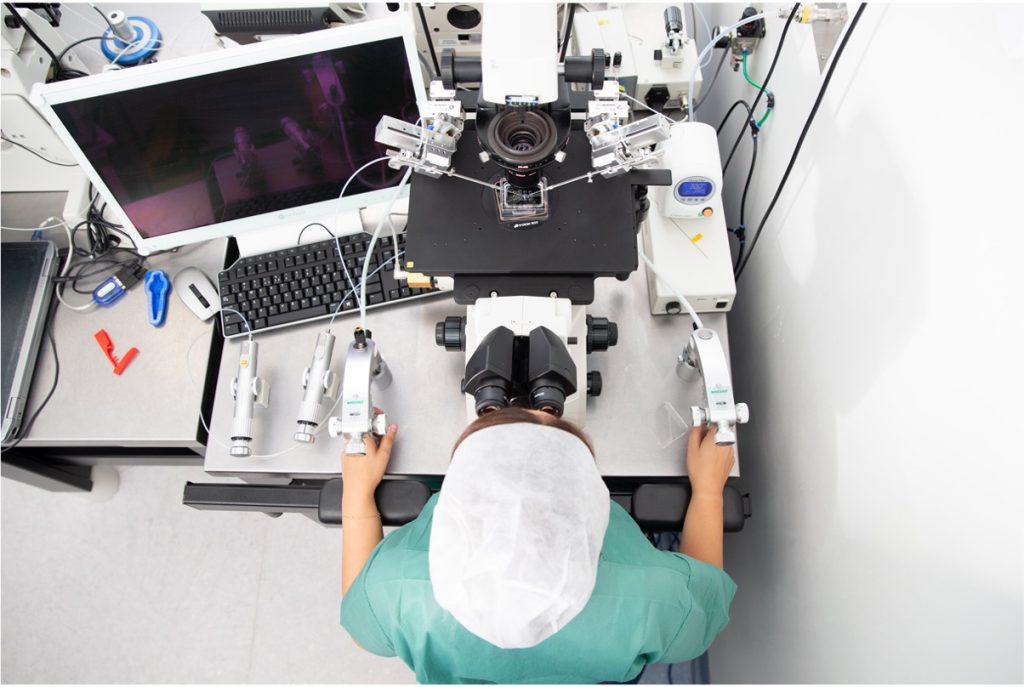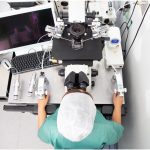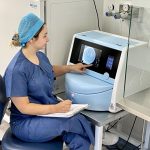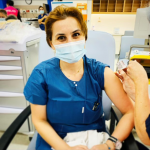
Embryologists are highly trained scientists who are responsible for the laboratory procedures involved in fertility treatment. Embryologists gain their skills through dedication to hands-on experience and the theoretical understanding of human reproduction, infertility, assisted reproductive technologies, commitment to research, and enthusiasm for introducing the latest proven technologies into their practices.
Embryology Laboratory Procedures
There are a number of laboratory procedures the embryologist is responsible for supporting:
Oocyte (Egg) pick-up (OPU): At Westmead Fertility Centre one of our embryologists is with our patients in the procedure room for the oocyte pick up. From the moment the oocytes are collected they need to be handled safely and appropriately. The embryologist immediately searches the follicular fluid that is extracted from patients’ ovaries to locate and determine the quality of the oocytes collected. The healthy oocytes are separated from the fluid in which they are collected and placed in nutrient-rich medium and maintained in an environment with temperature and humidity to replicate, as near as possible, the conditions found in a women’s fallopian tubes.
After the OPU, our embryologists at Westmead Fertility Centre will discuss the number and quality of the oocytes collected, the next steps in the laboratory, and how we will communicate with you throughout your cycle to keep you updated on your progress. It is very important to us that our patients are kept well informed about their embryos and know they are in safe hands under the best possible care.
Preparation of semen samples: Once the semen sample is received at the laboratory, the sample is assessed for sperm count (concentration), motility (movement) and morphology (shape). The sample is prepared by a ‘washing’ process and the high quality sperm are prepared to fertilise the oocytes with either IVF or ICSI techniques.
At Westmead Fertility Centre our approach is different to other fertility clinics – our embryologists work very closely with our patients and their fertility specialist to decide if IVF or ICSI will deliver the best outcome. Our individualised treatment plans ensure the best method is used for our patients’ particular situations, rather than simply using a one-size-fits-all approach.
Insemination: The process of insemination involves bringing the oocytes and sperm together to encourage fertilisation. There are two options for insemination: IVF or ICSI.
• In vitro fertilisation (or IVF) involves mixing the sperm and the eggs together and allows the healthy sperm to swim to, and bury themselves into, the egg.
• In some cases a single sperm will need to be injected directly into the egg – this process is called ICSI (Intra Cytoplasmic Sperm Injection). ICSI is an advanced and specialised technique which requires considerable skill, incredible precision and state of the art technology.
Fertilisation, culture and monitoring: Following insemination, the gametes are stored in a tightly controlled environment with optimal conditions for development. They are initially monitored for signs of fertilisation, and then for health and quality of the embryos. During this time, their environment has to be continuously managed to ensure it replicates the changing conditions of the journey through the fallopian tubes to the uterus. Growth patterns are meticulously observed and recorded by the Embryologist. Embryos are very sensitive to environmental changes, so we try to not disturb them during their time in culture. Many clinics take embryos out daily to let patients know how they are growing, but this practice may result in extra stress on the embryos and has capacity to reduce the chances of a pregnancy. Taking this into account, you won’t hear from our team during the culture period, but we will tell you everything you need to know about your embryos at the time of embryo transfer.
Embryo Biopsy: If required, an embryo biopsy can be performed to remove cells for preimplantation genetic testing (PGT). This is an extremely delicate procedure that involves the embryologist removing a small number of cells and is performed on day four embryos. Such screening allows a genetic scientist to examine the embryos for chromosomal abnormalities or genetic defects. PGT can be useful for improving the likelihood that a healthy embryo is transferred and in some situations may reduce the chance of miscarriage related to a chromosomal issue.
Noting, at this time, Westmead Fertility Centre does not offer PGT.
Embryo Grading: Through the process of monitoring the embryos in culture, our embryologists are continuing assessing and grading the embryos to attempt to select the healthiest embryos to transfer back into the uterus.
Embryo Transfer: The embryologist prepares the best embryo(s) for transfer to the uterus on day three to five after fertilisation. The embryos are carefully aspirated into a transfer catheter under a microscope which the fertility specialist uses to transfer the embryo into the uterus through the cervix. Our embryologists will be in the procedure room at the time of the embryo transfer procedures to deliver the embryos and assist the fertility specialist.
Cryopreservation: This is a process where our embryologists freeze or vitrify embryos for use at a later stage. This means that any excess embryos not transferred back to the uterus can be stored for a less invasive frozen embryo transfer cycle at a later time. The techniques used to freeze the embryos give a near 100% survival rate after thawing at Westmead Fertility Centre. Cryopreservation has also become a vital technique for women who cannot immediately undergo embryo transfer, and for women who may need to store embryos due to upcoming cancer treatments.
With all of these critical processes so dependent on the expertise of the embryologist, choosing a fertility clinic with a dedicated and experienced team of embryologist is essential.
To understand some of the questions you should be asking about a clinic’s embryologists visit ‘Questions to ask your clinic about their embryologists’.
















